| Number |
Portrait |
Nominee |
Replacing |
Prior Experience |
Date of Senate
Confirmation |
President |
|---|
| 1 | 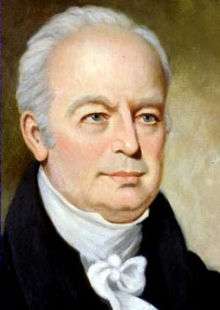 | John Rutledge | (new seat) | Governor of South Carolina | September 26, 1789 | George Washington*** |
| 2 | 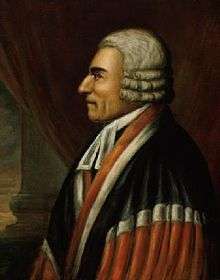 | William Cushing | (new seat) | Chief Justice of the Massachusetts Superior Court, Associate Justice of the Massachusetts Superior Court | September 26, 1789 |
| 3 |  | James Wilson | (new seat) | Lawyer | September 26, 1789 |
| 4 | 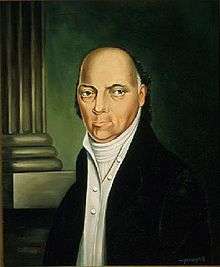 | John Blair | (new seat) | Member of the Virginia House of Burgesses | September 26, 1789 |
| 5 |  | James Iredell | (new seat) | North Carolina Attorney General, Judge of the North Carolina Superior Court | February 10, 1790 |
| 6 | .jpeg) | Thomas Johnson[3] | Rutledge | Governor of Maryland, Delegate to the Continental Congress | November 7, 1791 |
| 7 |  | William Paterson | Johnson | Governor of New Jersey, United States Senator from New Jersey, New Jersey Attorney General | March 4, 1793 |
| 8 |  | Samuel Chase | Blair | Chief Justice of the Maryland General Court, Chief Justice of the District Criminal Court in Baltimore, Delegate to the Continental Congress, | January 27, 1796 |
| 9 |  | Bushrod Washington | Wilson | Member of the Virginia House of Delegates | December 20, 1798 | John Adams* |
| 10 |  | Alfred Moore | Iredell | Judge of the North Carolina Superior Court, North Carolina Attorney General, Member of the North Carolina General Assembly | December 10, 1799 |
| 11 |  | William Johnson | Moore | Speaker of the South Carolina House of Representatives | March 24, 1804 | Thomas Jefferson |
| 12 | 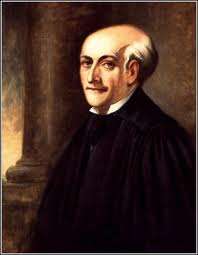 | Henry Brockholst Livingston | Paterson | Justice of the New York Supreme Court | December 17, 1806 |
| 13 |  | Thomas Todd | (new seat) | Chief Justice of the Kentucky Court of Appeals, Associate Justice of the Kentucky Court of Appeals | March 2, 1807 |
| 14 |  | Gabriel Duvall | Chase | Member of the U.S. House of Representatives from Maryland's 2nd district, U.S. Comptroller of the Treasury, Member of the Maryland House of Delegates | November 18, 1811 | James Madison |
| 15 | .jpg) | Joseph Story | Cushing | Member of the U.S. House of Representatives from Massachusetts's 2nd district, Member of the Massachusetts House of Representatives | November 18, 1811 |
| 16 |  | Smith Thompson[3] | Livingston | Justice of the New York Supreme Court, Member of the New York State Assembly | December 9, 1823 | James Monroe |
| 17 |  | Robert Trimble | Todd | District Judge of the United States District Court for the District of Kentucky, U.S. Attorney for the District of Kentucky, Associate Justice of the Kentucky Court of Appeals, Member of the Kentucky House of Representatives | May 9, 1826 | John Quincy Adams |
| 18 |  | John McLean | Trimble | United States Postmaster General, Associate Justice of the Supreme Court of Ohio, Member of the U.S. House of Representatives from Ohio's 1st district, | March 7, 1829 | Andrew Jackson* |
| 19 | .jpg) | Henry Baldwin | Washington | Member of the U.S. House of Representatives from Pennsylvania's 14th district | January 6, 1830 |
| 20 |  | James Moore Wayne | Johnson | Judge of the Superior Court of Georgia, Judge of the Georgia Court of Common Pleas, Mayor of Savannah, Georgia, Member of the Georgia House of Representatives | January 9, 1835 |
| 21 |  | Philip Pendleton Barbour | Duvall | District Judge of the United States District Court for the Eastern District of Virginia, Speaker of the United States House of Representatives, Member of the U.S. House of Representatives from Virginia's 11th district, Member of the Virginia House of Delegates | March 15, 1836 |
| 22 |  | John Catron | (new seat) | Chief Justice of the Tennessee Supreme Court of Errors and Appeals, Associate Justice of the Tennessee Supreme Court of Errors and Appeals | March 8, 1837 |
| 23 |  | John McKinley | (new seat) | United States Senator from Alabama, Member of the U.S. House of Representatives from Alabama's 2nd district, Member of the Alabama House of Representatives | September 25, 1837 | Martin Van Buren |
| 24 |  | Peter Vivian Daniel | Barbour | District Judge of the United States District Court for the Eastern District of Virginia, Lieutenant Governor of Virginia Member of the Virginia House of Delegates | March 2, 1841 |
| 25 | 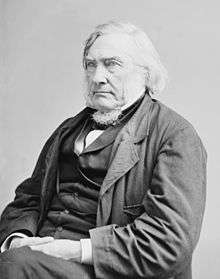 | Samuel Nelson | Thompson | Chief Justice of the New York Supreme Court, Justice of the New York Supreme Court, Judge of New York's Sixth Circuit Court | February 14, 1845 | John Tyler |
| 26 |  | Levi Woodbury[3] | Story | United States Secretary of the Treasury, United States Secretary of the Navy, Governor of New Hampshire, United States Senator from New Hampshire, Justice of the New Hampshire Superior Court of Judicature | January 31, 1846 | James K. Polk |
| 27 | 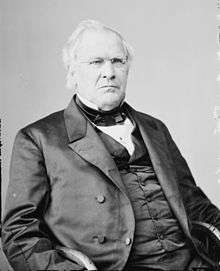 | Robert Cooper Grier | Baldwin | Judge for the Pennsylvania state District Court for Allegheny County | August 4, 1846 |
| 28 |  | Benjamin Robbins Curtis[3] | Woodbury | Member of the Massachusetts House of Representatives | December 20, 1851 | Millard Fillmore |
| 29 |  | John Archibald Campbell | McKinley | Member of the Alabama House of Representatives | March 22, 1853 | Franklin Pierce |
| 30 |  | Nathan Clifford | Curtis | United States Minister to Mexico, United States Attorney General, Member of the U.S. House of Representatives from Maine's 1st district, Maine Attorney General, Speaker of the Maine House of Representatives | January 12, 1858 | James Buchanan |
| 31 |  | Noah Haynes Swayne | McLean | U.S. Attorney for the District of Ohio, Member of the Ohio House of Representatives | January 24, 1862 | Abraham Lincoln* |
| 32 |  | Samuel Freeman Miller | Daniel | Lawyer | July 16, 1862 |
| 33 |  | David Davis | Campbell | Judge of Illinois Eighth Judicial Circuit Court, Member of the Illinois House of Representatives | December 8, 1862 |
| 34 |  | Stephen Johnson Field | (new seat) | Chief Justice of California, Associate Justice of the California Supreme Court, Member of the California State Assembly | March 10, 1863 |
| 35 |  | William Strong | Grier | Justice of the Supreme Court of Pennsylvania, Member of the U.S. House of Representatives from Pennsylvania's 9th district | February 18, 1870 | Ulysses S. Grant* |
| 36 |  | Joseph Philo Bradley | (new seat) | Lawyer | March 21, 1870 |
| 37 |  | Ward Hunt | Nelson | Associate Judge of the New York Court of Appeals, Member of the New York State Assembly | December 11, 1872 |
| 38 |  | John Marshall Harlan | Davis | Attorney General of Kentucky, County judge for Franklin County, Kentucky | November 29, 1877 | Rutherford B. Hayes |
| 39 |  | William Burnham Woods | Strong | Circuit Judge for the United States Court of Appeals for the Fifth Circuit, Member of the Ohio House of Representatives | December 21, 1880 |
| 40 | 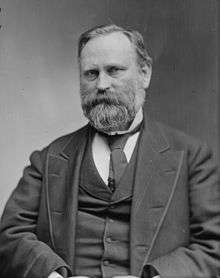 | Thomas Stanley Matthews | Swayne | U.S. Attorney for the Southern District of Ohio, Member of the Ohio Senate, Member of the Ohio House of Representatives | May 12, 1881 | James Garfield |
| 41 |  | Horace Gray | Clifford | Chief Justice of the Massachusetts Supreme Judicial Court, Associate Justice of the Massachusetts Supreme Judicial Court | December 20, 1881 | Chester A. Arthur |
| 42 |  | Samuel Blatchford | Hunt | Circuit Judge of the United States Court of Appeals for the Second Circuit, District Judge of the United States District Court for the Southern District of New York | March 22, 1882 |
| 43 |  | Lucius Quintus Cincinnatus Lamar | Woods | United States Secretary of the Interior, United States Senator from Mississippi, Member of the U.S. House of Representatives from Mississippi 1st district | January 16, 1888 | Grover Cleveland* |
| 44 |  | David Josiah Brewer | Matthews | Circuit Judge of the United States Court of Appeals for the Eighth Circuit, Associate Justice of the Kansas Supreme Court, Judge of Kansas' First Judicial District | December 18, 1889 | Benjamin Harrison |
| 45 |  | Henry Billings Brown | Miller | District Judge of the United States District Court for the Eastern District of Michigan | December 29, 1890 |
| 46 |  | George Shiras, Jr. | Bradley | Lawyer | July 26, 1892 |
| 47 |  | Howell Edmunds Jackson | Lamar | Circuit Judge of the United States Court of Appeals for the Sixth Circuit, Member of the Tennessee House of Representatives | February 18, 1893 |
| 48 |  | Edward Douglass White | Blatchford | United States Secretary of the Interior, United States Senator from Louisiana, Associate Justice of the Louisiana Supreme Court, Member of the Louisiana State Senate | February 19, 1894 | Grover Cleveland |
| 49 |  | Rufus Wheeler Peckham | Jackson | Associate Judge of the New York Court of Appeals | December 9, 1895 |
| 50 | .jpg) | Joseph McKenna | Field | United States Attorney General, Circuit Judge of the United States Court of Appeals for the Ninth Circuit, Member of the U.S. House of Representatives from California's 3rd, Member of the California State Assembly | January 21, 1898 | William McKinley |
| 51 |  | Oliver Wendell Holmes, Jr.[3] | Gray | Chief Justice of the Massachusetts Supreme Judicial Court, Associate Justice of the Massachusetts Supreme Judicial Court | December 4, 1902 | Theodore Roosevelt |
| 52 |  | William R. Day | Shiras | Circuit Judge of the United States Court of Appeals for the Sixth Circuit, United States Secretary of State, United States Assistant Secretary of State, | February 23, 1903 |
| 53 |  | William Henry Moody | Brown | United States Attorney General, United States Secretary of the Navy, Member of the U.S. House of Representatives from Massachusetts 6th, U.S. Attorney for the Eastern District of Massachusetts | December 12, 1906 |
| 54 |  | Horace Harmon Lurton | Peckham | Dean of the Vanderbilt University School of Law, Circuit Judge of the U.S. Court of Appeals for the Sixth Circuit, Associate Justice of the Tennessee Supreme Court | December 20, 1909 | William Howard Taft* |
| 55 |  | Charles Evans Hughes | Brewer | Governor of New York, Special Assistant to the U.S. Attorney General, Professor | May 2, 1910 |
| 56 | 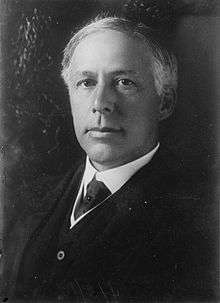 | Willis Van Devanter | White | Circuit Judge of the United States Court of Appeals for the Eighth Circuit, Chief Justice of the Wyoming Supreme Court | December 15, 1910 |
| 57 | 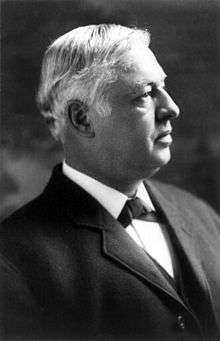 | Joseph Rucker Lamar | Moody | Associate Justice of the Supreme Court of Georgia, Member of the Georgia House of Representatives | December 15, 1910 |
| 58 | 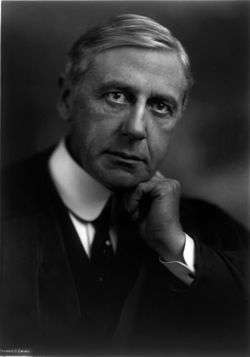 | Mahlon Pitney | Harlan | Member of the U.S. House of Representatives from New Jersey's 4th, Associate Justice of the New Jersey Supreme Court | March 13, 1912 |
| 59 |  | James Clark McReynolds | Lurton | United States Attorney General, United States Assistant Attorney General, Professor | August 29, 1914 | Woodrow Wilson |
| 60 |  | Louis Brandeis | Lamar | Lawyer | June 1, 1916 |
| 61 |  | John Hessin Clarke | Hughes | District Judge of the United States District Court for the Northern District of Ohio | July 24, 1916 |
| 62 |  | George Sutherland | Clarke | United States Senator from Utah, Member of the U.S. House of Representatives from Utah's at-large district, Member of the Utah State Senate | September 5, 1922 | Warren G. Harding* |
| 63 |  | Pierce Butler | Day | President of the Minnesota State Bar Association | December 21, 1922 |
| 64 |  | Edward Terry Sanford | Pitney | District Judge of the United States District Court for the Middle District of Tennessee, District Judge of the United States District Court for the Eastern District of Tennessee, United States Assistant Attorney General | January 29, 1923 |
| 65 |  | Harlan F. Stone | McKenna | United States Attorney General, Dean of Columbia Law School | February 5, 1925 | Calvin Coolidge |
| 66 |  | Owen Josephus Roberts | Sanford | Assistant District Attorney for Philadelphia | May 20, 1930 | Herbert Hoover* |
| 67 |  | Benjamin N. Cardozo | Holmes | Chief Judge of the New York Court of Appeals, Associate Judge of the New York Court of Appeals, Justice of the New York Supreme Court | February 24, 1932 |
| 68 |  | Hugo Black | Van Devanter | United States Senator from Alabama, Jefferson County, Alabama Prosecuting Attorney | August 17, 1937 | Franklin Delano Roosevelt* |
| 69 | 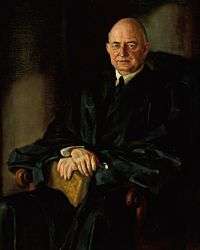 | Stanley Forman Reed | Sutherland | United States Solicitor General, General Counsel of the U.S. Reconstruction Finance Corporation, General Counsel of the U.S. Federal Farm Board, Member of the Kentucky House of Representatives | January 25, 1938 |
| 70 |  | Felix Frankfurter | Cardozo | Chair of Harvard Law School, Co-founder of the American Civil Liberties Union, General Counsel to the National Consumers League | January 17, 1939 |
| 71 | 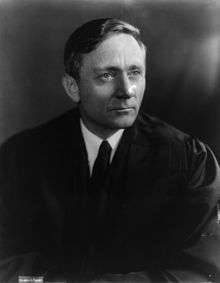 | William O. Douglas | Brandeis | Chairman of the Securities and Exchange Commission, | April 4, 1939 |
| 72 |  | Frank Murphy | Butler | United States Attorney General, Governor of Michigan, U.S. High Commissioner of the Philippines, U.S. Governor-General of the Philippines, Mayor of Detroit, Michigan, Judge of the Detroit Recorder's Court, U.S. Attorney for the Eastern District of Michigan | January 16, 1940 |
| 73 |  | James F. Byrnes | McReynolds | United States Senator from South Carolina, Member of the U.S. House of Representatives from South Carolina's 2nd district | June 12, 1941 |
| 74 |  | Robert H. Jackson | Stone | United States Attorney General, United States Solicitor General, Assistant Attorney General for the Antitrust Division, U.S. Assistant Attorney General for Tax Division, General Counsel to the Bureau of Internal Revenue, Chairman of the American Bar Association's Conference of Bar Association Delegates | July 7, 1941 |
| 75 |  | Wiley Blount Rutledge | Byrnes | Circuit Judge of the United States Court of Appeals for the District of Columbia Circuit, Dean of the Washington University School of Law, Dean of the University of Iowa College of Law | February 8, 1943 |
| 76 |  | Harold Hitz Burton | Roberts | United States Senator from Ohio, Mayor of Cleveland, Cleveland City Law Director, Member of the Ohio House of Representatives | September 19, 1945 | Harry S. Truman* |
| 77 |  | Tom C. Clark | Murphy | Attorney General of the United States, Assistant Attorney General for the Criminal Division, Assistant Attorney General for the Antitrust Division, Special Assistant to the U.S. Attorney General for War Risk Litigation, District Attorney for Dallas, Texas | August 18, 1949 |
| 78 | 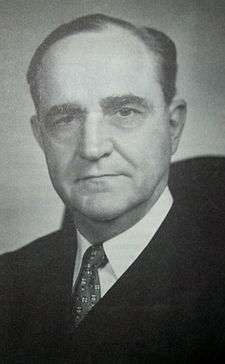 | Sherman Minton | Rutledge | Circuit Judge of the United States Court of Appeals for the Seventh Circuit, United States Senator from Indiana | October 4, 1949 |
| 79 |  | John Marshall Harlan II | Jackson | Circuit Judge of the United States Court of Appeals for the Second Circuit, Special Assistant Attorney General of New York, Assistant U.S. Attorney for the Southern District of New York | March 16, 1955 | Dwight D. Eisenhower* |
| 80 |  | William J. Brennan[3] | Minton | Associate Justice of the Supreme Court of New Jersey, Judge of the New Jersey Superior Court | March 19, 1957 |
| 81 |  | Charles Evans Whittaker | Reed | Circuit Judge of the United States Court of Appeals for the Eighth Circuit, District Judge of the United States District Court for the Western District of Missouri | March 19, 1957 |
| 82 |  | Potter Stewart[3] | Burton | Circuit Judge of the United States Court of Appeals for the Sixth Circuit, Member of the Cincinnati City Council | May 5, 1959 |
| 83 | 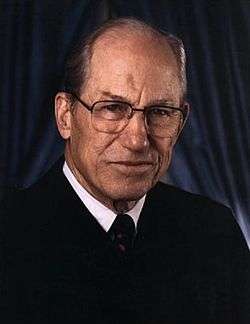 | Byron White | Whittaker | United States Deputy Attorney General | April 11, 1962 | John F. Kennedy |
| 84 |  | Arthur Goldberg | Frankfurter | United States Secretary of Labor | September 25, 1962 |
| 85 | 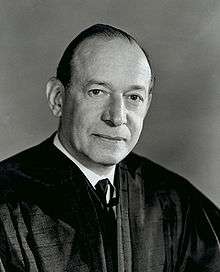 | Abe Fortas | Goldberg | United States Under Secretary of the Interior, General Counsel of the Public Works Administration | August 11, 1965 | Lyndon B. Johnson |
| 86 | 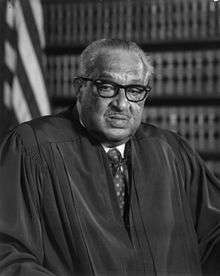 | Thurgood Marshall | Clark | United States Solicitor General, Circuit Judge of the United States Court of Appeals for the Second Circuit, Chief Counsel for the NAACP | August 30, 1967 |
| 87 |  | Harry Blackmun | Fortas | Circuit Judge of the United States Court of Appeals for the Eighth Circuit | May 12, 1970 | Richard Nixon* |
| 88 |  | Lewis Franklin Powell, Jr. | Black | President of the American Bar Association, Chairman of the Richmond Virginia, School Board | December 6, 1971 |
| 89 |  | William Rehnquist | Harlan | United States Assistant Attorney General for the Office of Legal Counsel | December 10, 1971 |
| 90 |  | John Paul Stevens | Douglas | Circuit Judge of the United States Court of Appeals for the Seventh Circuit, Second Vice President of the Chicago Bar Association | December 17, 1975 | Gerald Ford |
| 91 |  | Sandra Day O'Connor | Stewart | Judge of the Arizona Court of Appeals, Judge of the Maricopa County Superior Court, Majority Leader of the Arizona Senate, Member of the Arizona Senate, Assistant Attorney General of Arizona | September 21, 1981 | Ronald Reagan* |
| 92 | 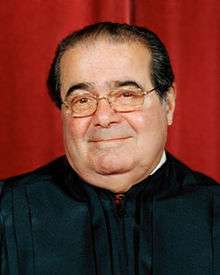 | Antonin Scalia | Rehnquist | Circuit Judge of the United States Court of Appeals for the District of Columbia Circuit, United States Assistant Attorney General for the Office of Legal Counsel, Chairman of the Administrative Conference of the United States, General Counsel to the Office of Telecommunications Policy | September 17, 1986 |
| 93 |  | Anthony Kennedy | Powell | Circuit Judge of the United States Court of Appeals for the Ninth Circuit, Member of the board of the Federal Judicial Center | February 3, 1988 |
| 94 |  | David Souter | Brennan | Circuit Judge of the United States Court of Appeals for the First Circuit, Associate Justice of the New Hampshire Supreme Court, Associate Justice of the Superior Court of New Hampshire, Attorney General of New Hampshire, Deputy Attorney General of New Hampshire | October 2, 1990 | George H. W. Bush |
| 95 | 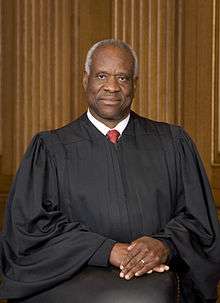 | Clarence Thomas | Marshall | Circuit Judge of the United States Court of Appeals for the District of Columbia Circuit, Chairperson of the Equal Employment Opportunity Commission, Assistant Secretary of Education for the Office for Civil Rights, Assistant Attorney General of Missouri | October 15, 1991 |
| 96 |  | Ruth Bader Ginsburg | White | Circuit Judge of the United States Court of Appeals for the District of Columbia Circuit, General Counsel of the American Civil Liberties Union | August 3, 1993 | Bill Clinton |
| 97 | 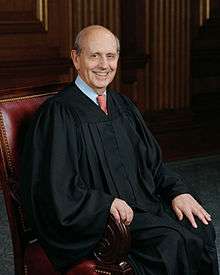 | Stephen Breyer | Blackmun | Chief Judge of the United States Court of Appeals for the First Circuit, Circuit Judge of the United States Court of Appeals for the First Circuit | July 29, 1994 |
| 98 |  | Samuel Alito | O'Connor | Circuit Judge of the United States Court of Appeals for the Third Circuit, United States Attorney for the District of New Jersey, Assistant U.S. Attorney for the District of New Jersey | January 31, 2006 | George W. Bush* |
| 99 |  | Sonia Sotomayor | Souter | Circuit Judge of the United States Court of Appeals for the Second Circuit, District Judge of the United States District Court for the Southern District of New York, Assistant District Attorney for New York County, New York | August 6, 2009 | Barack Obama |
| 100 | .jpg) | Elena Kagan | Stevens | Solicitor General of the United States, Dean of Harvard Law School, Associate White House Counsel, Deputy Director of the Domestic Policy Council | August 5, 2010 |








.jpg)





.jpeg)








.jpg)



.jpg)






























.jpg)










































